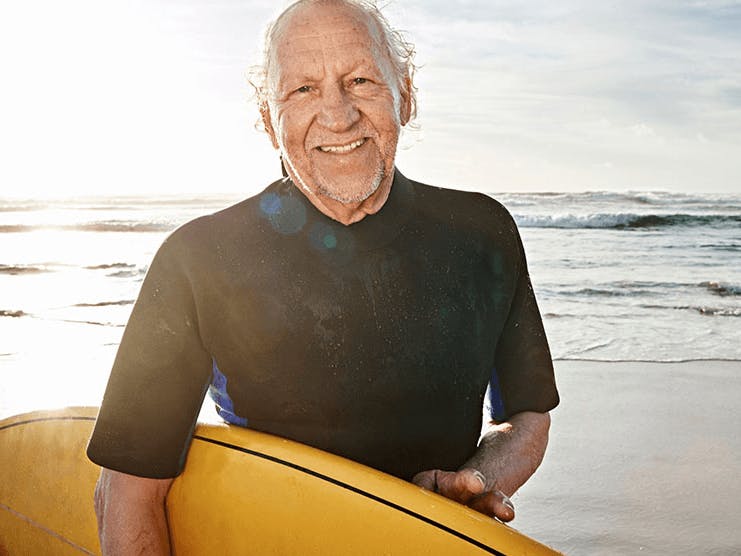
Whether your goal is to run a marathon or start a business, you’re never too old to get started. These people prove anything is possible.
The first step toward achieving any goal is just that—taking the first step. All the hard work that follows becomes easier once you have some momentum behind you. You just have to acknowledge what you want and then make a motion toward it. There’s a misconception that chasing dreams is for young people. As it turns out, that’s true only for people who believe it. The folks you’re about to meet do not. Here are their stories.
Barbara Fratta ran her first marathon at 67
When Barbara Fratta used to watch her younger daughter run track and cross-country, she would daydream about huffing alongside her. She had run as a child, but never competitively or as an adult. Seeing her daughter compete created a whole new appeal for the sport and Fratta couldn’t stop thinking about it. “Her coaches said to me, ‘Why don’t you get out there and run too?’” she says. “But I just never did.”
That changed in 2010, when Fratta and her husband retired in New York City. With her new free time, Fratta knew she wanted to run. But first, she prepared herself: She joined Weight Watchers, began walking and hiking, and lost 40 pounds. The next year, newly slim at age 65, she worked up her nerve and replied to an ad for a women’s running club.
“They literally took me by the hand and led me to Central Park,” she says. “The group had a couple of us who were starting out. So they taught us how to do all the stretching, and they had us do a run-walk.”
Fratta went back the next week and the next, until three months had gone by. At that point, she had progressed so much that they moved her into a more advanced running group that didn’t take walk breaks. She was running 3 miles at a time. “It just progressed from there,” she says. Within her first year of running, Fratta signed herself up for a half-marathon.
To train, she joined a group of other “older runners” who were as crazy as she was. And when she crossed the finish line, she was thrilled—but she knew she had a better time in her. She finished in 2 hours, 53 minutes. She wanted to do better.
Fratta joined yet another group of runners who focused specifically on speed work. This time she was the oldest of the bunch. But it worked. She trimmed more than 30 minutes off of her half-marathon time.
Success begets success, and soon Fratta’s new running friends were pushing for more. “They said, ‘Let’s all train together for the New York City Marathon,’” she says. “‘We’ll do it together.’”
Just two years after lacing up her running shoes for the first time as an adult, Fratta agreed to run a full marathon. “They were my motivation,” she says. “I don’t think I could have done it on my own.”
When the day came, her friends and family lined up along the running route to shout words of encouragement as she ran past. She completed the 26.2-mile run in 5 hours. Today, at 74, she’s run three marathons and 19 half-marathons.
One unexpected benefit? Taking up running brought Fratta closer to her cross-country-running daughter, who continued running as an adult. “She is just so positive,” says Fratta. “She would give me pointers almost every day. It brought us super close because my husband didn’t get it, and neither did other family members. But she got it.”
Fratta didn’t just find a new way to challenge herself and stay fit. She found a way to bond further with the daughter who inspired her for all those years.
Darlene Briscoe became a tribal law lawyer at 72
Darlene Briscoe was never hindered by age. She started law school in her early 50s, just as her youngest child was graduating from high school and moving away from home. And once classes began, Briscoe discovered a particular area of legal interest: Native American tribal law.
Tribal law covers the rules and regulations that tribes use to govern themselves. They’re distinct from the laws of local governments, but as a student, Briscoe didn’t know how to pursue it. “[At the time,] there was no way to specialize in tribal law,” she says. “There was no way for me to actually make a move.”
The interest simmered in the back of her mind as she finished her degree, and at 55, Briscoe became an attorney. For 17 years, she practiced public and criminal defense law. But after her husband died, she no longer had a reason to stay in her home state of Indiana.
Just as she’d done when her daughter left home, Briscoe started thinking about her next move. She could travel anywhere, and she homed in on South Dakota. “From there, I just basically stuck a pin in the map of South Dakota and came up with the Rosebud reservation,” she says. “I found out there were some jobs open. And I left.”
Briscoe didn’t know anybody in South Dakota, and she didn’t have a job. She knows it sounds brave to move somewhere totally new in your 70s. But she didn’t see it that way. “I don’t see it as courageous,” she says. “I see it as doing what I needed to do.”
But her determination didn’t protect her from feeling out of place. “It felt like driving onto a Western movie set,” she says. There were no stores or paved roads. And it took her a bit longer than expected to find a job—white people are not often brought into the reservation’s legal system, she says. But Briscoe’s determination paid off. She started offering basic legal services, and over time, she proved herself worthy. “By grit and by gumption, I was able to meet a lot of tribal members,” she says. Soon she was the acting public defender for the Rosebud tribe.
Briscoe spent three years on the reservation. It was a tough job, and the learning curve was steep. “The law was similar, but the culture was very different,” she says. So in addition to her legal work, she took up substitute teaching to delve deeper into the culture. “I really wanted to learn the people,” she says. “I wanted to know as much about them as I could, and I loved working with the kids.”
“The most rewarding part for me was that I gained the trust of many of the tribal leaders,” she says. “At first, they didn’t believe I knew anything about tribal law. I knew a lot more than they thought I did! But by the end, to know that they trusted me to honor their culture was really amazing.”
Today, Briscoe is 80. And while her time on the reservation is over, she still has an adventurous streak. “I’m not fearless by any stretch,” she says. “But I do like new experiences. I like to grow and learn. Even at my age, I just like it.”
Barbara Sperling opened her first business at 64
Like many people, Barbara Sperling dreamed of running her own small business. Her version of the fantasy involved home accessories. Sperling made her career in business management, but on weekends she would visit home boutiques with her children. “I used to say to my daughters all the time, ‘One day I’m going to have a store,’” she says. “I’d been saying that forever, but I needed to make a living.”
So while her career hummed along, so did her daydream. “I wasn’t quite sure how I was going to open a store, but I never stopped saying it.” Sperling’s weekend shopping trips left her with such an impressive collection of home accessories that she would joke that her house looked like the shop she dreamed of owning. She thought that might be as close as she would ever get to reaching her goal, and for years, that was good enough.
But as retirement neared, Sperling began thinking more about her dream. She considered applying for a job in an accessory store, but the more she turned the idea over in her head, the more she realized it didn’t have the same appeal. She wanted to be the one curating the selection. She wanted something she could truly own.
Sperling was in her early 60s when she hired an interior designer to do some work on her home. The designer was driving from store to store to gather home accessories. “She’d bring them all here to see if they worked in my home, and then she’d return what she didn’t use,” says Sperling. That’s when Sperling blurted it out: What if they started their own shop with a better curated inventory? “Then designers don’t have to go from store to store,” she said. “They can just come to our store instead.”
Much to her surprise, her interior designer was receptive. It was a strike of good fortune, and the new partners set off to find a storefront. Soon they settled on one in Rye, New York, a suburb not far from Sterling’s home in New York City.
To stock their shelves, the two partners traveled to gift shows and design markets in Atlanta and North Carolina. Sperling applied her business acumen to managing inventory and payroll, and shortly after, The Open House was up and running. After a lifetime of dreaming about it, Sperling launched her business right as she was reaching the age when most people start to think seriously about retirement.
Today, Sperling is 74. After 10 years in business, she still works six days a week—and she loves it. “No matter how I feel in the morning when I wake up—and I certainly have started getting aches and pains—by the time I get to the store, I have forgotten anything that hurts,” she says. “I’m just so happy there.”


